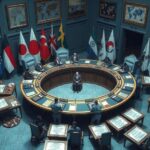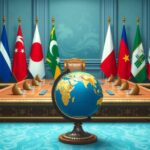Assessing Russia’s Perspectives on Global Diplomacy and Current Conflicts
Dmitry Polyanskiy criticizes the Biden administration’s impact on the Ukraine war, asserting it worsened tensions. He respects the Trump administration’s realistic approach and highlights Saudi Arabia’s emerging role as a diplomatic hub. Polyanskiy discusses Russia’s support for Sudan and the importance of unity in the Arab world concerning the Gaza crisis, while emphasizing the necessity of the two-state solution for lasting peace.
In a recent interview on the Arab News program “Frankly Speaking,” Dmitry Polyanskiy, the first deputy permanent representative of Russia to the UN, criticized the Biden administration’s approach to the Ukraine conflict, asserting that it exacerbated the situation rather than resolved it. He suggested that a shift in accountability and perspective could have paved the way for a solution long ago. According to Polyanskiy, the prior U.S. administration contributed to the tensions by engaging in actions perceived as anti-Russian, leading to the escalation that precipitated the ongoing conflict.
Polyanskiy noted that Washington’s actions contributed to heightened hostilities, asserting, “The Biden administration was one of those who were fueling the war…” He characterized the previous Trump administration’s stance as more realistic, suggesting it demonstrated a better understanding of the realities of warfare and advocated for proposals aimed at ceasefire. The talks held in Riyadh featured a draft agreement concerning a ceasefire and sanctions, marking Saudi Arabia’s rising role in global diplomacy.
Polyanskiy acknowledged the significance of Saudi Arabia’s diplomatic endeavors, stating that new centers of diplomatic activity are emerging. He expressed gratitude for the host nation’s engagement, praising their constructive facilitation of consultations. Furthermore, he envisaged Riyadh becoming an influential diplomatic hub, particularly concerning negotiations with Russia, Ukraine, and the United States.
On broader geopolitical issues such as the Gaza crisis, Polyanskiy stressed the challenges Russia faces in exerting influence over Israel compared to the U.S. He emphasized that Arab unity is vital for effecting meaningful change and reiterated the necessity of a two-state solution for lasting peace in the region. The interview highlighted his criticism of prior normalization attempts, which he believed sidelined crucial Palestinian issues.
Addressing the conflict in Sudan, Polyanskiy conveyed Russia’s support for the Sudanese government and optimism regarding the military situation’s apparent stabilization. He resisted characterizations of famine in the region, attributing food distribution challenges to political motives and foreign interference. In discussing Syria, Polyanskiy avoided hypothetical questions about Bashar Assad but emphasized the need for an inclusive, stable governance structure post-conflict. He reaffirmed Russia’s commitment to fostering long-term relations with Syria and aiding the nation in its transitional phase.
The interview with Dmitry Polyanskiy underscores Russia’s critical perspectives on U.S. foreign policy, particularly regarding Ukraine, the Middle East, and Sudan. Polyanskiy urges recognition of changing diplomatic dynamics, particularly with Saudi Arabia’s growing role in international negotiations. He emphasizes the importance of Arab unity and a two-state solution in the Israeli-Palestinian conflict while affirming Russia’s commitment to supporting sovereign governance in conflict-stricken nations like Sudan and Syria. Overall, his insights provide a window into Russia’s strategic positioning amidst ongoing global conflicts.
Original Source: www.arabnews.jp








Post Comment